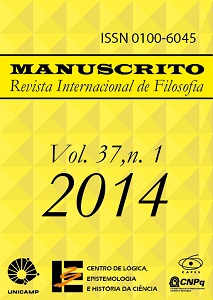Resumo
In this paper I am concerned with the problem of applying the notion of rigidity to general terms. In Naming and Necessity, Kripke has clearly suggested that we should include some general terms among the rigid ones, namely, those common nouns semantically correlated with natural substances, species and phenomena, in general, natural kinds -‘water’, ‘tiger’, ‘heat’- and some adjectives - ‘red’, ‘hot’, ‘loud’. However, the notion of rigidity has been defined for singular terms; after all, the notion that Kripke has provided us with is the notion of a rigid designator. But general terms do not designate single individuals: rather, they apply to many of them. In sum, the original concept of rigidity cannot be straightforwardly applied to general terms: it has to be somehow redefined in order to make it cover them. As is known, two main positions have been put forward to accomplish that task: the identity of designation conception, according to which a rigid general term is one that designates the same property or kind in all possible worlds, and the essentialist conception, which conceives of a rigid general term as an essentialist one, namely, a term that expresses an essential property of an object. My purpose in the present paper is to defend a particular version of the identity of designation conception: on the proposed approach, a rigid general term will be one that expresses the same property in all possible worlds and names the property it expresses. In my opinion, the position can be established on the basis of an inference to the best explanation of our intuitive interpretation and evaluation, relative to counterfactual circumstances, of statements containing different kinds of general terms, which is strictly analogous to our intuitive interpretation and evaluation, relative to such circumstances, of statements containing different kinds of singular ones. I will argue that it is possible to offer a new solution to the trivialization problem that is thought to threaten all versions of the identity of designation conception of rigidity. Finally, I will also sketch a solution to the so-called ‘over-generalization and undergeneralization problems’, both closely related to the above-mentioned one.
Referências
BEEBEE, H. & SABBARTON-LEARY, N. The Semantics and Metaphysics of Natural Kinds, Routledge, 2010.
DEVITT, M. “Donnellan’s Distinction”. In: P. A. French, T. E. Uehling and H. K. Wettstein (eds.) Midwest Studies in Philosophy VI. Minneapolis: University of Minnesota Press (1981), pp. 511-24.
DEVITT, M. “The Case for Referential Descriptions”. In: M. Reimer and A. Bezuindenhout (eds.) Descriptions and Beyond. Oxford: Clarendon Press (2004), pp. 280-305.
DEVITT, M. “Rigid Application”. Philosophical Studies, 125, pp.139-165, 2005.
DEVITT, M. & STERELNY, K. Language and Reality. Cambridge: the MIT Press. 2nd. Edition, 1999.
DONNELLAN, K. “Reference and Definite Descriptions”. Philosophical Review, 77, pp. 281-304, 1966.
FRENCH, P. A. & UEHLING, T. E. & WETTSTEIN, H. K. Midwest Studies in Philosophy, Vol. 6. Minneapolis: University of Minnesota Press, 1981.
FRENCH, P. A. & UEHLING, T. E. & WETTSTEIN, H. K. Midwest Studies in Philosophy, Vol. 2. Studies in the Philosophy of Language Minneapolis: University of Minnesota Press, 1977.
GÓMEZ-TORRENTE, M. “Beyond Rigidity? Essentialist Predication and the Rigidity of General Terms”. Crítica, 36, pp. 37-54, 2004.
GÓMEZ-TORRENTE, M. “Rigidity and Essentiality”. Mind, 115, pp. 227-259, 2006.
KRIPKE, S. “Speaker’s Reference and Semantic Reference”. In: P. A. French, T. E. Uehling and H. K. Wettstein (eds.) Midwest Studies in Philosophy, Vol. 2: Studies in the Philosophy of Language (1977).
KRIPKE, S. Naming and Necessity. Cambridge, MA: Harvard UP, 1980.
LAPORTE, J. “Rigidity and Kind”. Philosophical Studies, 97, pp. 293-316, 2000.
LAPORTE, J. “Rigid Designators for Properties”. Philosophical Studies, 130, pp. 321-336, 2006.
LEWIS, D. “New Work for a Theory of Universals”. Australasian Journal of Philosophy, 61, pp. 343-377, 1983.
LINSKY, B. “General Terms as Designators”. Pacific Philosophical Quarterly, 65, pp. 259-276, 1984.
LÓPEZ DE SA, D. “Rigidity, General Terms and Trivialization”. Proceedings of the Aristotelian Society, 107, pp. 117-122, 2007.
LÓPEZ DE SA, D. “The Over-Generalization Problem: Predicates Rigidly Signifying the ‘Unnatural’”. Synthese, 163, pp. 263- 272, 2008a.
LÓPEZ DE SA, D. “Rigidity for Predicates and the Trivialization Problem”. Philosopher’s Imprint, 8, No. 1, 2008b.
MARTÍ, G. “Rigidity and General Terms”. Proceedings of the Aristotelian Society, 104, pp. 129-146, 2004.
MARTÍ, G. & MARTÍNEZ-FERNÁNDEZ, J. “General Terms as Designators: A Defense of the View”. In: H. Beebee and N. Sabbarton-Leary (eds.) The Semantics and Metaphysics of Natural Kinds (2010), pp. 46-63.
NEALE, S. Descriptions. Cambridge (MA): MIT Press, 1990.
PERRY, J. Reference and Reflexivity. Stanford: CSLI Publications, 2001.
REIMER, M. & BEZUINDENHOUT, A. Descriptions and Beyond. Oxford: Clarendon Press, 2004.
SALMON, N. “Are General Terms Rigid?”. Linguistics and Philosophy, 28, pp. 117-134, 2005.
SCHNIEDER, B. “Property Designators, Predicates and Rigidity”. Philosophical Studies, 122, pp. 227-241, 2005.
SCHWARTZ, S. “Kinds, General Terms and Rigidity”.
Philosophical Studies, 109, pp. 265-277, 2002.
SOAMES, S. Beyond Rigidity. Oxford: Oxford University Press, 2002.
SOSA, D. “Rigidity in the Scope of Russell's Theory”. Noûs, 35, pp. 1-38, 2001.
STRAWSON, P. “On Referring”. Mind, 59, pp. 320-344, 1950.
WETTSTEIN, H. “Demonstrative Reference and Definite Descriptions”. Philosophical Studies, 40, pp. 241-257, 1981.
WETTSTEIN, H. “The Semantic Significance of the ReferentialAttributive Distinction”. Philosophical Studies, 44, pp. 187-94, 1983.
ZERBUDIS, E. ms. “La rigidez de las expresiones predicativas”. PhD dissertation, 2009.

